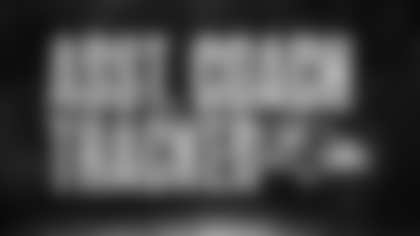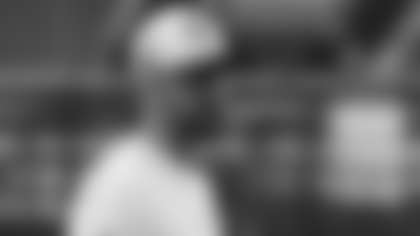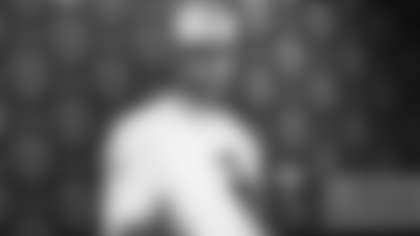DAILY INTERVIEW TRANSCRIPTS
Assistant Head Coach/Special Teams Coordinator Jerry Rosburg
On his rules for returning the ball when it is kicked into the end zone:"The rules we have are our rules, so I'm not going to share all our rules for you. But judgment comes into play in those situations. When you have a kick that's high and hanging and deep, and you're going backwards, that's not a good point where we want to bring the ball out. There are other points where the ball might be of the same depth, where you're in front of the ball and rolling into it, and it's more of a line-drive kick where it would be exactly the same spot. [That] would be a completely different situation."
On whether there is still an understanding that punt returners don't return balls that go inside the 10-yard line:"I think a lot of teams, ourselves included, have that rule as a bit more flexible because the pooch punters are so much better than they used to be. The way that they punt the ball and the skill with which they punt has changed a lot. I don't have a statistical backup for that. But as you notice, there are a lot of players using the reverse-spin pooch ball instead of the regular, traditional punt. And as a result, they are a lot more skilled at placing the ball, and the ball doesn't react after it hits the ground the same; you see a lot more backspin. So I think teams, ourselves included, have made that 10-yard line rule a little more flexible depending on the type of punt that it is."
On why there have been a lot of kicks returned for touchdowns around the NFL:"It's hard to say because those things go up and down, as you know. One of the things that may be a contributing factor is that teams are now more accustomed to the two-man wedge rule, [whereas] last year teams were just getting used to it and their schemes were adjusted. And then they've had a chance during the offseason to study themselves and study others and figure out what's best for them."
On whether WR David Reed could be involved in the return game:"David had some reps in preseason, as you might recall. You look at David as he plays offense and special teams… He's a guy that's just a natural football player. You watch him… You put him on kickoff coverage, and he makes tackles; you put him in gunner, and he makes tackles; you put him at corner, and he blocks guys. I would guess that the best way I would categorize David is he's just a… He's very much of a football player. We have a lot of guys that we're working in the return game, and he's one of them."
On whether there is a secret ingredient for players to be more explosive on kick returns:"Well, if I had that ingredient, I'd go to the grocery store and purchase a big bucket of it. But the way we look at it, the secret ingredient is good practice. It's hard work, it's attention to detail, [and] it's film study. It's all those things that go in to football and all parts of football. We're not happy with our return game right now. Our players aren't' happy. I'm not happy. Returners aren't happy. The blockers aren't happy. Reporters aren't happy. *(laughter) *So we all want it to be better, and we're working hard to try to correct that."
Offensive Coordinator Cam Cameron
On whether he feels like the play-calling was aggressive enough in the fourth quarter and overtime at New England, or if he would change anything, given another chance:"I think anytime in critical situations, when things don't work out the way you want them to, you always evaluate. And if you had a crystal ball, you might do some things differently, and at the same time, there are things that you wouldn't do differently. I'd say in that game, it was probably somewhere in between. And for our guys, the effort they gave, to make the amount of plays that they made, it's unfortunate that we weren't able to get it done at the end of the game. And obviously, this point in the week, that has got to be in the rear view mirror, and you had to have already learned, grown and moving on. So, a lot of great things [were] done that game, [but] obviously, not enough. And for us to keep putting our defense back out there, back out there, back out there, is really not what we're trying to do. I think everybody knows that. And at the same time – because we'll be talking about this, it won't be the last time – even when you're winning, there are things that you can still do better. And that's what we're trying to do, is to just keep improving on offense, keep getting better, take care of the football – which we've started doing a better job of – and now we just need to make sure we continue to grow and execute in critical situations."
On if he dislikes people characterizing play-calling as "too conservative":"You know, everybody has a view of that. And sometimes, plays, the way they turn out can look conservative. I was telling somebody [that] I was at the Dickinson [versus Johns] Hopkins game the other night, and [it was] the same deal. There were some execution issues going on, but I know the structure of the play called – and it's an aggressive play call – but for whatever reason, it looked conservative. And I think I learned this back with LaDainian [Tomlinson]: Handing the ball to Ray Rice is not conservative, because we've all seen that thing run right out of the stadium. And it's just really a little bit of a mindset, and I really kind of understand it, [that] passing is aggressive and running is conservative, when in reality, depending on your personnel, it's really not the case. So, we don't want to be conservative, but we want to be smart aggressive. I think that's what we want to be. We want to be aggressive and smart, and then execute at the same time."
On whether he would like to see his offense get more accustomed to the "two-deep" look from opposing defenses:"Yeah, here's the deal on that. [New England] did it in the second quarter, [and] we executed pretty well. They did it in the third quarter, fourth… What really got us, and allowed them to play that coverage, is I think we had eight or nine third-and-nine-plusses. So, think about it: You're playing defense, it's third-and-nine-plus. Probably most teams aren't running it on third-and-nine-plus. They're spying the screens – which everyone has done that to us the entire year – and so, it's really something we've seen throughout the year. They had an opportunity to play it, and a lot of that was due to some things that we need to improve on in first and second downs. So, the best answer for that coverage, No. 1, is to not be third-and-long that many times. But OK, you get in that situation, you're not going to… You're in that situation, you've got to find a way to make a play, catch it underneath the markers and run for it, but make sure you've got something behind the marker, then get a first down. And that's what we try to do – make sure we've got three levels, to where the quarterback has an option, to where he can throw it beyond the sticks, and sometimes you're going to throw it underneath and you've got to run for a first down."
On whether there is a fine line when deciding to play "smart aggressive" on offense:"Every team… To answer you – no. It's not really tough to balance. It really isn't, because every offensive group is different. You look around the league, some people put all their money on the offense [and] some people don't. So we're fortunate. We have options both run and pass, and we're going to continue to do that. We're going to utilize the running game [and] utilize the passing game. Where we can continue to grow is in obvious passing situations, [we need to] make sure that we can execute the level that we need to, especially in critical situations – especially late in games."
On a report that he had a meeting with QB Joe Flacco this week:"No. There was no big meeting with me and Joe. There was a conversation between me and Joe after every game, like there always is. And I'll tell you exactly what I said. I said, 'Joe'… Because I believe this, I said, 'Joe, I could've helped you better. I could've helped you better at times in that game.' That's my job. My job is to help the quarterback as much as I can and help this offense. And Joe said to me, 'I could have done a better job.' And that's the relationship that you have with your quarterback. The coordinator feels like he can do a better job, and the quarterback thinks he can do a better job. And that's how you become a great offense. If everybody becomes one way or the other, we know how that works. We see that happen all the time in this league. And that's what's going to make us special. I think Joe with this offense, with our guys… Our receivers all came in thinking they could've done a better job. Our offensive line, guys came in saying, 'Hey, I can play better.' Our running… Every single guy on our offensive unit came in to our meeting on Monday and said, 'I could've done something better to help win that game.' And I know the coordinator felt the same way. And that's why we've got a chance. And that's why we're going to be tough on people to defend every week."
On whether a report that Flacco was told where to throw at the end of the Patriots' game is accurate:"That has not been done. We don't do that. Joe knows how to read defenses. He knows he has multiple options. To my knowledge, it's inaccurate because it didn't come from me. I know it didn't come from [QBs coach] Jim [Zorn]. And I'm a little bit like Joe right now: We're really so zeroed in on Buffalo, it's almost hard to revisit some of that stuff. But in no way, shape or form, I don't think anybody is doing that."
On whether Flacco is playing better than ever:"Statistically, I don't really know. I know he's had some really good stretches. I know this: He's getting better every day. And again, I say this to you every week, I get to watch him every day in practice, I'm in meetings with him; he's getting better every day. There's no ceiling on this guy [and] how good he can be with the group that we have. We have a great group on offense, and Joe knows that. Obviously, he's played pretty good for four weeks."
On where Flacco has progressed from Year Two to Three:"Just continually fundamentals, techniques and then adapting to how people defend us differently, whether they're doubling Todd Heap or doubling [Derrick] Mason… People started out doubling Mason early in the year, then it shifted to clouding to 'Q' [Anquan Boldin], then it's been a little bit of Heap. They've been tripling Ray [Rice] basically with both ends and a back all year long. So he's getting a feel for how people see us and how we get defended a little bit differently each week. And so, as a quarterback, you've got to make that adjustment. You've got to really be aware of what people are doing to us throughout the course of the game, and I think he's doing a great job of that."
Defensive Coordinator Greg Mattison
On why the defense was tired late in Sunday's game: "I'd be not telling the truth if you wouldn't say that they were tired. You don't play 70-some snaps, a game-and-a-quarter and not spend everything you have out there. I think in the fourth quarter and the overtime, they went some hurry, hurry. They went no-huddle, which taxes you. They got in and out of personnel groups, which kind of helped them with the bye week. I think our kids… I was proud of how we played. [If] you're a great defense, you always want to hold the lead. That's the bottom line. But, as far as if you said, 'What did they do?' Our guys gave everything they had out there, and I'm sure they would all say everybody could do better, including the coach. I could have done a better job. That situation right there is something we learn from. We'd love to have learned and won it, but there's things in there that we learn from."
On the thinking behind the three-man rush: "People always talk about us and a three-man rush, but I think if they added up the number of pressures we've had, they might be as high as anybody else. The thing that happens when teams give you empty [backfields] – which we got a lot of no-back formations – you've got a choice. You've got a choice of either putting everybody one-on-one and rushing four, where the ball is going to come out immediately anyhow, or you've got a choice of blitzing everybody and having nobody back there, or you drop eight to try to help yourself with coverage and rush three. That's what the empty formation does. So, I think you'd see that a lot of the three-man rushes came because they were in an empty backfield. I think the same questions would be coming up right now if we would have went zero blitz on every one of those empties and they threw them over our heads. You've got Tom Brady, and you've got some good wide receivers where you're going to hit some of those when there's nobody back there. It was our decision to try to mix it up between a four-man rush, pressure and dropping eight. I think if you look at third-down percentage – which is the biggest thing that you look for – our defense, those players did a tremendous job to hold them to 29 percent. Now, I'll qualify that. A great defense, you hold the lead at the end. That's the bottom line in that whole thing."
On not stopping New England on third downs late and what the Patriots were trying to do: "Well, they put [Danny] Woodhead in the game, who is also a very good running back, but a great receiver. On one of those gains that he had of 12 or 14 yards – you talk about pressure – that was a pressure. So, all of a sudden, you're pressuring and you've got Haruki [Nakamura] standing over the tight end, and they run the football with the tailback. That's what you have to realize. OK, you want to pressure, it's a calculated risk right there. There's the 12 yards. You know what I mean? So, you can't have both. Now, if I would have known they were going to run the football right there, we would have been in a four-man front and we would have stopped the run. But then at the same time, they'd say, 'Well, why aren't you pressuring?' OK, well, we pressured and that was one of those that got us. That's part of it. That's what they did. Woodhead ended up… Woodhead is a really good running back. That was an off week thing that hadn't happened, and all of a sudden, he's in there now and now you've got to look at him as a running back as well as a wide receiver. It gives them an added thing."
On what he tells his defensive guys regarding tackling with the helmet-to-helmet hit policy: "The same as what we've done all along. We have never… Our players have never… There's not a player in that room that would say, 'I want to try to lead with my head into his head, and I want to try to knock him out.' You wouldn't hear a guy say that. I think if you've watched us all year, and some of the hits we've had, it's the strike zone. Everything we do is in the strike zone. It's been taught that way from Day One, and our players believe in it wholeheartedly and have done it."
On how S Ed Reed looked in practice yesterday and how they want to get him involved in the mix again: "Ed Reed has played long enough in this league and has done so many great things in this league [that] Ed Reed will let us know when Ed Reed is ready to go. He's not a guy that you have to question. Ed Reed will only go out and play if he thinks he can play well enough to help win and for him to do what he has to do. So, Ed Reed will go out and practice and he'll continue to work on the things and run the defenses and stuff like that. If he feels like he's ready to go, then that'll be his decision, and we'll go from there. But, him behind out there – I want you to know – there's a lot of smiles when you saw him standing back there. I said this before, and I've only been here with him for three years, but [gosh] he looks good out there."
On whether practice was different yesterday with Reed returning: "I guess anytime you add him to the secondary and you look out there and you see that number… It's different for me; I know that. That's not taking anything away from Tom Zbikowski – he's done a tremendous job – but that's Ed Reed. Just the vibrancy and just to hear him talking back there saying, 'Watch this, watch that.' That's what he brings to the table."
On whether facing the Bills after a bye week makes it more difficult: "Oh, yeah. Anytime in the NFL when somebody has a bye week… There's some great coaches in this league. They're not on vacation. What you have to do is you have to always prepare 'what if's'. What could they do? What is something more they could do? But at the same time, you can't panic and you can't give your defense so many things that all of a sudden, you don't get the regular things down. So, we have to be ready to adjust. I know they're going to give us something different. I know there's going to be something more, but usually what happens, what you see the first quarter is what you get. That's something… The New England game is over with, but that's something [Belichick] did a great job of. He kind of held it until late and then came up with new things. And then all of a sudden, you go, 'OK, here we've got to get this done.' But a lot of teams usually will show you what they're going to do in the first part of that game."
On how DT Haloti Ngata's effective pass rush enables and benefits others on the defense: "It's any one of the front four rushing the passer. [Terrell] Suggs was the same way. We expect them to get there. Haloti got… I think two of his sacks were on pressures, which when you pressure you end up sometimes freeing up somebody. You don't know who is going to be free, but that guy has to be there, and he did it. He did it. Haloti just is day-in and day-out and week-in and week-out [consistent]. He has played just like you would expect him to and just like he had practiced all camp.* *The sky is the limit for him. He's having a tremendous year right now."
On how much trouble was caused when S Tom Zbikowski went out of the game in the fourth quarter: "That's huge. That's huge. And, it was really… He really was [bothered] at the end of the third [quarter], where he tried to play some. I mean you've got a guy that's your starter, and in a game where they're obviously throwing it every second [down]... You take your starting safety out – the guy that's gotten all the reps – that safety is a key person in our defense. Then, it even watered down the other packages when you wanted to try to bring in an extra defensive back when they were going empty and that kind of thing. Well, you kind of watered it down there. That hurt us a bunch. Anytime you lose a starter, the next guy has got to step up, which they did. But, that was tough."
On whether S Haruki Nakamura is prepping to start with the uncertainty surrounding Reed and Zbikowski: "Yeah, Haruki has always prepped for starting. You've heard me say this before: Whoever is the backup has got to look at himself as a starter. You're always one play away from being in there anyhow, so we've got guys getting ready for that."
On whether LB Brendon Ayanbadejo will play in the nickel package when he returns: "We've got a whole season. You've got to find out what happens sometime during this year. Again, Brendon is like Ed Reed. When he's ready to go, when he feels completely comfortable with his body and with his mental part of it, then he's earned the right to be back where he's been. It's just a matter of how it goes. Now, Dannell [Ellerbe] has done a great job as the dime. That's helped us."

















